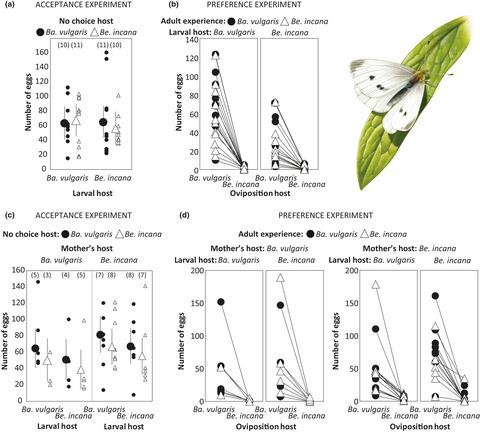当前位置:
X-MOL 学术
›
Ecol. Evol.
›
论文详情
Our official English website, www.x-mol.net, welcomes your
feedback! (Note: you will need to create a separate account there.)
Innate preference hierarchies coupled with adult experience, rather than larval imprinting or transgenerational acclimation, determine host plant use in Pieris rapae
Ecology and Evolution ( IF 2.3 ) Pub Date : 2020-12-08 , DOI: 10.1002/ece3.7018 Hampus Petrén 1 , Gabriele Gloder 2 , Diana Posledovich 3 , Christer Wiklund 3 , Magne Friberg 1
Ecology and Evolution ( IF 2.3 ) Pub Date : 2020-12-08 , DOI: 10.1002/ece3.7018 Hampus Petrén 1 , Gabriele Gloder 2 , Diana Posledovich 3 , Christer Wiklund 3 , Magne Friberg 1
Affiliation

|
The evolution of host range drives diversification in phytophagous insects, and understanding the female oviposition choices is pivotal for understanding host specialization. One controversial mechanism for female host choice is Hopkins’ host selection principle, where females are predicted to increase their preference for the host species they were feeding upon as larvae. A recent hypothesis posits that such larval imprinting is especially adaptive in combination with anticipatory transgenerational acclimation, so that females both allocate and adapt their offspring to their future host. We study the butterfly Pieris rapae, for which previous evidence suggests that females prefer to oviposit on host individuals of similar nitrogen content as the plant they were feeding upon as larvae, and where the offspring show higher performance on the mother's host type. We test the hypothesis that larval experience and anticipatory transgenerational effects influence female host plant acceptance (no‐choice) and preference (choice) of two host plant species (Barbarea vulgaris and Berteroa incana) of varying nitrogen content. We then test the offspring performance on these hosts. We found no evidence of larval imprinting affecting female decision‐making during oviposition, but that an adult female experience of egg laying in no‐choice trials on the less‐preferred host Be. incana slightly increased the P. rapae propensity to oviposit on Be. incana in subsequent choice trials. We found no transgenerational effects on female host acceptance or preference, but negative transgenerational effects on larval performance, because the offspring of P. rapae females that had developed on Be. incana as larvae grew slower on both hosts, and especially on Be. incana. Our results suggest that among host species, preferences are guided by hard‐wired preference hierarchies linked to species‐specific host traits and less affected by larval experience or transgenerational effects, which may be more important for females evaluating different host individuals of the same species.
中文翻译:

先天偏好层次与成虫经验相结合,而不是幼虫印记或跨代驯化,决定了菜青虫寄主植物的使用
寄主范围的进化推动了植食性昆虫的多样化,了解雌性产卵选择对于理解寄主特化至关重要。雌性宿主选择的一个有争议的机制是霍普金斯的宿主选择原则,其中预计雌性会增加对它们幼虫时期赖以生存的宿主物种的偏好。最近的一项假设认为,这种幼虫印记与预期的跨代适应相结合特别具有适应性,因此雌性可以将其后代分配并适应未来的宿主。我们研究了菜粉蝶(Pieris rapae),之前的证据表明,雌性更喜欢在与幼虫时所摄食的植物氮含量相似的宿主个体上产卵,并且后代在母亲的宿主类型上表现出更高的性能。我们测试了以下假设:幼虫经历和预期的跨代效应影响雌性寄主植物对不同氮含量的两种寄主植物(Barbarea vulgaris和Berteroa incana)的接受(无选择)和偏好(选择)。然后我们测试这些宿主上的后代表现。我们没有发现幼虫印记影响雌性产卵过程中决策的证据,但在非选择试验中,成年雌性在较不喜欢的宿主Be 上有产卵的经历。incana略微增加了菜籽油菜在 Be 上产卵的倾向。incana在随后的选择试验中。我们发现对雌性寄主的接受或偏好没有跨代影响,但对幼虫性能有负面的跨代影响,因为在 Be 上发育的油菜雌性的后代。incana作为幼虫在两个宿主上生长缓慢,尤其是在Be 上。因卡纳。我们的结果表明,在宿主物种中,偏好受到与物种特异性宿主特征相关的硬连线偏好层次的指导,并且受幼虫经验或跨代效应的影响较小,这对于评估同一物种的不同宿主个体的雌性可能更重要。
更新日期:2021-01-08
中文翻译:

先天偏好层次与成虫经验相结合,而不是幼虫印记或跨代驯化,决定了菜青虫寄主植物的使用
寄主范围的进化推动了植食性昆虫的多样化,了解雌性产卵选择对于理解寄主特化至关重要。雌性宿主选择的一个有争议的机制是霍普金斯的宿主选择原则,其中预计雌性会增加对它们幼虫时期赖以生存的宿主物种的偏好。最近的一项假设认为,这种幼虫印记与预期的跨代适应相结合特别具有适应性,因此雌性可以将其后代分配并适应未来的宿主。我们研究了菜粉蝶(Pieris rapae),之前的证据表明,雌性更喜欢在与幼虫时所摄食的植物氮含量相似的宿主个体上产卵,并且后代在母亲的宿主类型上表现出更高的性能。我们测试了以下假设:幼虫经历和预期的跨代效应影响雌性寄主植物对不同氮含量的两种寄主植物(Barbarea vulgaris和Berteroa incana)的接受(无选择)和偏好(选择)。然后我们测试这些宿主上的后代表现。我们没有发现幼虫印记影响雌性产卵过程中决策的证据,但在非选择试验中,成年雌性在较不喜欢的宿主Be 上有产卵的经历。incana略微增加了菜籽油菜在 Be 上产卵的倾向。incana在随后的选择试验中。我们发现对雌性寄主的接受或偏好没有跨代影响,但对幼虫性能有负面的跨代影响,因为在 Be 上发育的油菜雌性的后代。incana作为幼虫在两个宿主上生长缓慢,尤其是在Be 上。因卡纳。我们的结果表明,在宿主物种中,偏好受到与物种特异性宿主特征相关的硬连线偏好层次的指导,并且受幼虫经验或跨代效应的影响较小,这对于评估同一物种的不同宿主个体的雌性可能更重要。











































 京公网安备 11010802027423号
京公网安备 11010802027423号